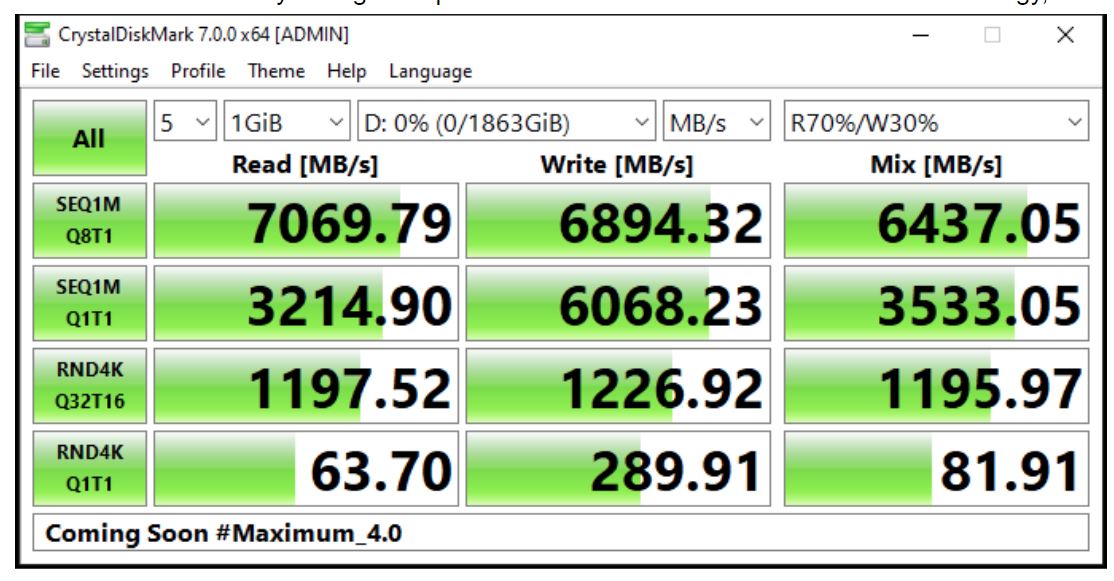Phison's New E18 SSD Controller Rivals Samsung 980 Pro With 7 GBps of Throughput
Phison brings the 7GBps pain
The battle to unseat Samsung as the SSD performance leader is in full swing as SSD manufacturers ready next-gen flash controllers that extract more of the full potential of the PCIe 4.0 interface. Now Phison has entered the fray with its preliminary Crystal Disk Mark results that it shared via social media. The test results tease the company’s soon-to-be-launched PS5018-E18 NVMe SSD controller that's in the final stages of development. Phison's posting comes after Samsung’s 980 Pro recently surfaced with impressive specs, and Sabrent fired back with the Rocket 4 Plus just a few days later.

The Phison team used a 2TB engineering sample for the demo, and it eclipses the 980 Pro's specs. The E18's performance results top 7 GBps of read throughput paired with 6.9 GBps of write bandwidth, with the latter beating the 980 Pro by about 1.8 GBps.
The E18 also posted 74,217 IOPS of random write performance at QD1, often the most important measurement for PC users, beating the 980 Pro by ~15,000 IOPS. The E18's 16,307 IOPS of QD1 random read performance trails the 980 Pro by ~5,000 IOPS, but Phison says these early results could improve as it further optimizes its firmware.
These results show very strong write performance thanks to Phison's CoXProcessor Technology, but the tri-core E18's peak random performance is rather average. This is primarily due to the current generation of NAND, which interfaces with the controller at lower I/O rates than the E18's rated 1,200 MTps capability. That means that although Micron's 96L B27A TLC NAND is very responsive flash when paired with the right controller and IP, these early performance numbers are really just a tease.
Phison should have access to Micron's B27B flash in January. This new revision features optimized geometries to crank up the I/O rate to match the E18's full capability. With further tuning, the company should be able to tweak the 4K random performance a bit higher. That will help not only performance but also power efficiency.
Samsung chose to go with TLC flash for its 980 Pro, a first for its Pro lineup, and it comes with surprisingly low endurance ratings. In contrast, aside from the E18's nasty performance, it also promises very high endurance capabilities as the company injected its fourth-gen LDPC ECC engine along with other data reliability tech.
Samsung has leveled the playing field in the high-performance SSD market by using TLC flash with its new high-end options, and that leaves an opening for third-party SSD controller makers to take the performance lead. As a result, Samsung might not have the edge over controller manufacturers like Phison any longer, and that means we could see a whole new wave of affordable third-party SSDs that arrive at lower prices than Samsung's premium drives. Phison's next wave of PCIe 4.0 x4 NVMe SSD controllers look promising, and we can't wait until we get some samples in the lab.
Get Tom's Hardware's best news and in-depth reviews, straight to your inbox.

Sean is a Contributing Editor at Tom’s Hardware US, covering storage hardware.
-
2Be_or_Not2Be Waiting to see tests if the new E18 controller does the same as the Samsung 980 - treat a chunk of the NAND as SLC, but have a bit of a write performance drop-off when the SLC area is done.Reply -
Makaveli Been looking forward to drives based on this controller may pick one up to fill my 2nd m2 slot.Reply
2Be_or_Not2Be said:Waiting to see tests if the new E18 controller does the same as the Samsung 980 - treat a chunk of the NAND as SLC, but have a bit of a write performance drop-off when the SLC area is done.
Since these are TLC drives i'm expecting it to be the same as current drives so sustained write hit should still be there. Unless they pull something new out of the hat.
From the article
"Samsung chose to go with TLC flash for its 980 Pro, a first for its Pro lineup, and it comes with surprisingly low endurance ratings. In contrast, aside from the E18's nasty performance, it also promises very high endurance capabilities as the company injected its fourth-gen LDPC ECC engine along with other data reliability tech. "
"Nasty performance" that is cute :) -
vinay2070 They used a 1GiB sample? Thats just burst. My 512GB 970 Evo shows 3500MBps writes with 1GiB. Using 16GiB tells a different story.Reply -
Makaveli My drive is using the E16 controller and this what I see, so I expect the E18 to produce better numbers.Reply
-
nofanneeded ReplyMakaveli said:My drive is using the E16 controller and this what I see, so I expect the E18 to produce better numbers.
Man dont run this benchmark 5 times 16 GB ?? , you just wasted 80x4=320GB from TBW endurance for nothing
these are 4 write tests of 16GB of data running 5 times !!! -
Makaveli This drive is rated for 1,800 TBW and its only 7 months old. And I only need to run that once!Reply